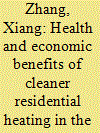| Srl | Item |
| 1 |
ID:
166328


|
|
|
|
|
| Summary/Abstract |
Millions of households in many underdeveloped countries use coal stoves for heating, which remains a major air pollution source. Since 2015, policies for substituting residential coal use with electricity have been implemented at unprecedented levels in the Beijing–Tianjin–Hebei (BTH) region, one of the most severely air polluted areas in China. This study evaluated the health benefits of the residential “coal-to-electricity” policy in the BTH region. We developed an integrated assessment model to investigate the impact of the policy on both the ambient and indoor air quality improvement. The private health benefits from indoor air quality improvements do not justify the costs. However, adding the spillover public health benefits from ambient air quality improvements, the policy brings net social benefits to the BTH region. Compared to a no-policy scenario, Beijing obtains the most health benefits and enjoys the most synergies from regional cooperation among the three provinces/municipalities. Hebei bears the highest cost since it has more households fueled by coal. Our results showing net social benefits provide support for a massive and accelerated implementation of this policy in the BTH region. The provincial distributional results can provide a reference for subsidies from Beijing and Tianjin to Hebei for achieving region-wide implementation.
|
|
|
|
|
|
|
|
|
|
|
|
|
|
|
|
| 2 |
ID:
102776


|
|
|
|
|
| Publication |
2011.
|
| Summary/Abstract |
Using the structural vector autoregression model, we estimate the current responses of monetary policy to contemporaneous shocks from macroeconomic variables. Our findings indicate that the People's Bank of China responded to inflation and output changes, but did not react to asset price fluctuations during the period from January 1997 to March 2010. The optimal monetary responses to exogenous shocks are also examined. It is revealed that using asset prices to formulate monetary policy would not help to improve monetary authorities' performance in lowering the volatilities of output growth and inflation while keeping output growth and inflation in their safety zones. The effectiveness of monetary policy and fiscal policy in reacting to external shocks is also discussed.
|
|
|
|
|
|
|
|
|
|
|
|
|
|
|
|
| 3 |
ID:
128374


|
|
|
|
|
| Publication |
2014.
|
| Summary/Abstract |
In this paper, we extend previous reference-dependence newsvendor research by incorporating both consumer trade-offs and government subsidies to evaluate the relevant influences on the optimal electric vehicle (EV) production decisions. We present the properties of the model, derive the closed-form solutions for the model given the relevant constraints, and use numerical experiments to illustrate the results. We find that subsidies, loss aversion, the performance of both EVs and internal combustion engine-powered vehicles (ICEVs), and the coefficient of variation of demand are significant factors influencing the optimal production quantity and the expected utilities of EV production. The high selling price and other high costs of ICEVs help offset the influence of loss aversion, whereas the high costs of EV enhance loss aversion. Our study enriches the literature on subsidies for EVs by establishing a behavioral model to incorporate the decision bias in terms of loss aversion at the firm level. These findings provide guiding principles for both policymakers and EV managers for making better strategies to promote EVs in the early immature market.
|
|
|
|
|
|
|
|
|
|
|
|
|
|
|
|